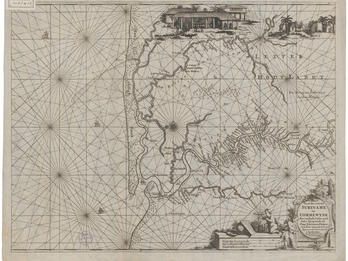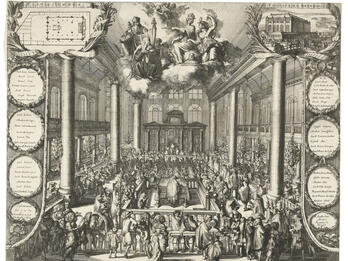Records
Slaughterers and examiners of the meat must be God-fearing individuals who will examine the knife very thoroughly. In any event, trusted men should be appointed to examine the slaughtering knife without notice, to ensure that the slaughterers are very careful. They must also examine all the slaughterers and examiners of meat in the whole district, to verify that they are well versed in the laws and that their hands are practiced in slaughtering. Furthermore, in every congregation, trusted men shall be appointed to watch over those requirements, transgressing which might make butchers give out non-kosher meat.
Kosher and non-kosher meat should not be sold from the same table, unless there is a large gap between them, or some particular item is placed between them.
Women should be warned that they must soak and salt the meat themselves, or it should be done by a Jewish servant woman, but never by their gentile servant women. Likewise, they must be careful when cooking food, as it has often happened that a wife has made her husband sin by placing something forbidden before him, or she put milk into a meat vessel or vice versa. There is also the issue of cooking by gentiles. Also, one should not give the servant a tallow candle [made from rendered animal fat], because she will not be careful about preventing it from dripping onto the vessels. Therefore, one who fears the word of God will be careful to give his gentile servant a wax candle when they are washing the dairy vessels.
It should be proclaimed in all communities that no person may make cheese or butter in the villages to sell to Jews, until he first comes before the head of his rabbinic court. The rabbi will inquire into his doings, to ascertain whether he is honest, and then he will be given a signed letter. If the person is unknown and unfamiliar to him, the rabbi should not grant him permission. In addition, no one should do this alone; that is, one should not travel from place to place unsupervised. In every place and at every fair, the sellers should be examined thoroughly to make sure they possess a letter of permission from their district’s rabbi.
There are known places in Wallachia where people catch kosher and non-kosher fish together, and it has been determined that they salt and dry these items together. Therefore, one must be careful not to buy those dried fish from anyone except a man who is known to be honest.
No person may determine for himself that he may drink in gentile taverns, for one who goes to drink there is an empty and light fellow [see Judges 9:4]. He should not be called by the title of rav or ḥaver and shall not be appointed to any position in the congregation.
One must be extremely careful to examine clothing to uphold the prohibition against sha‘atnez [clothes made of linen and wool], as many fail in this regard, especially in the case of women’s garments, for they sew a shvaif [train] on their garments, which have linen garments below, and place leather and the like between them and sew them, and that is absolutely sha‘atnez. Also, very often they transgress with a strakish [a kind of cloth], which is made in this country, as the warp is linen, and it is sewn onto a woolen garment. And also taitsh mekhayer [types of clothing, as are the following terms] and similar items, especially mentlekish, regarding which women fail greatly. Similarly, in the case of high and small zakin, which contain linen threads, one must remove them and further examine them for several kinds of sha‘atnez. One must also be careful to give the tailor hemp threads.
It should be decreed that men and women may not wear garments of gentiles, or the customary immodest outfits, in our many sins. Instead, the children of Israel should wear distinct items of clothing.
One must be very scrupulous about the prohibition of being alone with women, both in the city and when on the road. If one is traveling, it is not sufficient to have just a single chaperone. One must also inspect the chaperone, to make sure that he is not older or younger than required by law.
Furthermore, in the case of those who possess an arenda [the lease of an estate] and who live alone in villages, occasionally the man might travel to another village while his wife remains alone among the gentiles. Since the gentiles sometimes drink and get drunk in their homes, the heads of the state have decreed that only two householders with their wives, living together, may hold an arenda.
Attention should be paid to sellers of etrogim [citrons; fruit used in the Sukkot festival], that they should come some time before the festival, so that the etrogim can be sent to those who live a great distance away. One should protest against the sellers of Greek etrogim, who arrive early at the fairs of Jarosław and Lokva. People from near and far come to purchase them, and then forget to buy other kosher etrogim to beautify the festival.
God-fearing, scrupulous men should be appointed to examine the tefillin and mezuzot throughout the entire district.
Likewise, God-fearing, scrupulous men should also be appointed to examine the prayer books that are printed in Basel which have recently arrived, and also from some places on the Rhine, as some include heretical ideas and errors.
Attention should also be paid to oaths that are taken, especially when appointing heads and other positions, for the arbitrators and those who accompany them make them swear. How often does a great profanation of the Name of God result from this!
Credits
Published in: The Posen Library of Jewish Culture and Civilization, vol. 5.




